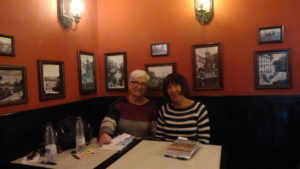Editor’s Note: the following homage in memoriam of the life and work of the poet Joe Ruggier appears through the kind permission of Michael Burch, editor of The HyperTexts (see below) We are grateful at Artvilla for this permission and understand that both he & Joe Ruggier were close friends as will become apparent in the text. Joe was also known to us at Poetry Life & Times www.artvilla.com where his contributions can be accessed via Categories on the right hand column. We also provide here the link to https://linearbknossosmycenae.com/2018/07/21/in-memoriam-joe-ruggier-canadian-poet-and-poetry-publisher/ where his sonnets were published in international, multilingual sonnet anthology, The Phoenix Rising from the Ashes = Le Phénix renaissant de ces cendres (251 pp.), published in 2013 by Richard Vallance Janke
We regretfully announce the sudden passing of Joe M. Ruggier at the age of 61 on Sunday July 8, 2018. Joe was born in Malta on July 26, 1956 and emigrated to Canada in 1981. He married Maria Julia Raminhos Lourenco in 1984, with whom he raised their daughter, Sarah Thérèse. Joe attended St. Aloysius’ College, then earned a B.A. in English with first class honours from the Royal University of Malta. He then continued his studies in Canada, earning a certificate in Writing and Publishing (SFU) and a Diploma in Typesetting (VCC). Joe wrote and published poetry in both Maltese and English, managed a small press, Multicultural Books of BC, and edited a poetry journal, The Eclectic Muse. His entrepreneurial spirit led him to publish dozens of titles, and he sold over 20,000 books, many of them door-to-door. Joe was committed to the written word, and to elevating the works of his peers and the poets he loved. In his final days he worked fervently, translating work by the Maltese priest, writer and poet, Dun Karm Psaila. Joe was passionate about his faith, his family—most especially his beloved Sarah Thérèse—international sports (soccer), languages, playing classical guitar and listening to his wide-ranging record collection.
My Memories of Joe Ruggier
by Michael R. Burch
Joe Ruggier, who published as Joe M. Ruggier, was a remarkable man, if a bit on the “unusual” side. And I met him in a very unusual way …
The year was 2002, and a poem of mine—”She Was Very Strange, and Beautiful”—had just been published by The Neovictorian/Cochlea, a literary journal edited by Esther Cameron. Esther contacted me to let me know that another editor had called her in order to get in touch with me, and had actually recited my poem to her over the phone! That was my introduction to Joe Ruggier. Of course I was honored and intrigued, so I called Joe with the number Esther provided, and from that day forward Joe and I became friends. Joe published three of my poems in his literary journal, The Eclectic Muse, including the one he had recited to Esther. The others were “Redolence” and “In Defense of Meter,” which I later re-titled “In Praise of Meter.” I don’t want this page to get bogged down with my poems, but they can be read here if anyone is interested.
Soon I was in for another very nice surprise, thanks to Joe. He called to tell me that a line in my poem “Auschwitz Rose” had caused him to jump out of his bus seat! Okay, enough about my poetry. From now on, we will focus on Joe’s. But I related these accounts to demonstrate Joe’s passion and appreciation for poetry. I am truly honored that he liked one of my poems enough to recite it, and another enough to jump out of his bus seat. Before I focus on Joe’s poetry and prose, please allow me to relate some brief biological information about him.
Joseph Mary Ruggier was born in Malta on July 26, 1956 and died at his home in Richmond, BC, Canada on July 8, 2018 at age 61. He wrote and published poetry in Maltese and English. Joe also managed a small press, Multicultural Books, and was the editor of a poetry journal, The Eclectic Muse. He was a remarkable man who sold over 20,000 books, most of them door-to-door, including over 10,000 books that he wrote and published himself. There are over 6,000 copies of his book Out of Blue Nothing in print. These are amazing figures for a contemporary poet: one man willing to buck the system and not accept the common wisdom that “poetry doesn’t sell.” Joe’s family was very important to him: he especially spoke and wrote with pride and admiration of his daughter, Sarah Thérèse, and his mother, Marie.
In addition to at least ten books of poetry, Joe left a highly original and unusual book of prose called Pope Caesar’s Wake. Joe’s Wake is an eclectic “conversation” comprised of lengthy letters he wrote to Pope John Paul II and the terse form letters he received in return (included in the form of photocopies). The conversation begins with a get-well letter Joe wrote to John Paul in 1981 and concludes a quarter century later with a letter written to his successor. Because the Vatican’s responses were invariably inadequate the book’s title became progressively more severe: first Homage to Pope Woytyla, then War and Peace with Pope Woytyla, and finally Pope Caesar’s Wake. In his letters Joe accused the Roman Catholic Church of being a “humourless apparatus of spiritual authority and heartless sin theology” that reduced him to a “nervous, suicidal, pathological wreck” and a “poor, neurotic demon.” He also complained that all his Catholic parents “could ever discuss” with him were “the Pope” and “mortal sin.” Joe’s innovative solution was to find a cure through the “healing power of genuine laughter.” Thus, Joe chose to “make the papacy a work of art” with his tongue planted firmly in cheek. In one letter Joe repeatedly exclaimed “Vendetta!” as he enumerated the Pope’s and Church’s sins against him. In another he compared the Pope and his cohorts to “the Argentineans in the days when they still used to break legs unscrupulously as long as they could carry away a soccer trophy.”
In my favorite letter, Joe told Pope Caesar: “If you are sincere, Your Holiness, take a leave of absence quietly from the Vatican for a few days, where You are surrounded by all the beautiful nudes of MichaelAngelo, come and visit a great Artist Yourself in his poor and lonely hermitage, bring a half a million United States dollars in an attaché case with You, bring a beautiful blonde from Heaven with You, and make sure I see no one else beside You … All I can offer You, unfortunately, is a cup of Earl Grey tea, or a little coffee. And I hope to give You back My baptismal certificate also because I do not need it.” By capitalizing “My” and “You,” Joe put himself on equal footing with the Pope. But alas, all he received in return for his passionate, artistic missives were the Vatican’s pedestrian form letters!
This is one of my favorite poems by Joe Ruggier, and a fine poem indeed:
Part 6 from The Dark Side of the Deity: Interlude
When Satan hurled, before the Dawn,
defiance at the Lord of History;
and Michael stood, and Glory shone,
Whose hand controlled the timeless Mystery?
Who but the Insult was the leveler;
Deliverer and bedeviler?
When Athens, sung in verse and prose,
caught all the World’s imagination;
when Ilion fell, and Rome arose,
and Time went on like pagination:
Who but the Insult was the leveler;
Deliverer and bedeviler?
When books, in numberless infinities,
cross-fertilize the teeming brain,
and warring, vex the Soul with Vanities,
and Insults hurtle, Insults rain:
Who but the Insult is the leveler;
Deliverer and bedeviler?
And when we too shall cease to be,
like all the Kingdoms of the Past,
and groaning, gasping, wrenching free,
we bite, at last, alone, the dust:
Who but the Insult is the leveler;
Deliverer and bedeviler?
When church-bells fill the wandering fields
with Love and Fear,
the Flesh and Blood of Jesus yields
deliverance dear,
to them who believe in the Compliment Sinsear.
This is a very tender devotional poem …
A Proof of Love
NOW WHEN I was fresh and easy, I would go
to Church … devotion fill’d my soul with tears.
I guessed not all Gospels could so tiresome grow—
the same words repeated for twice a thousand years.
But middle-aged I have become aware
of all the paranoia, boredom, pain,
where with lame hands I grope … of empty air
and dust, and chances lost, and littlest gain.
Yet here I am, my God, where I relax
in warmth of heaters, and Thy glowing smile,
where words, repeated, securer are than cheques,
the Love which then I felt, now lost awhile.
Thus We gave God, Whose Love does not change the story,
a proof of Love—seal of eternal glory!
From Songs of Gentlest Reflection, copyright © Joe M. Ruggier, 2003, 2004
I have never been a fan of the Christian dogma of hell, or of the Christian religion for that matter, but at least Joe puts an original twist on the subject …
Old Dante’s Damning Powers
Many people, in particular modern Catholics, are scandalized by Dante, particularly by his Inferno, wherein Dante positioned real, historical figures among others which are mythological. I once told the Catholics … “Church teaching about Hell is dogmatic theology whatever you say. Why does Dante make you such a terrible insult with Hell? Because he hates you? Or because he wishes you better? The critics, the poetry lovers, the professors understand Dante correctly, and so do the artists … the artists, in particular, are right to love Dante so deeply because they know that his honour is a sincere honour to them and they understand him most correctly in that they understand that his intentions are to save them!” The poem below is where my further reflections led me … Joe Ruggier
Old Dante’s damning powers are as God wants—
he snubs with Hell only where he wishes better.
If people do not like them, people should
control their own —damning powers being,
most likely, the only supernatural power
most people have. Dante’s Inferno speaks
to their condition: they read it and reread it;
and in regards to Hell, Church teaching is
dogmatic. If, however, it does not speak
to your condition, you may read Purgatory,
the most human, the most touching, among
great Poems, where, suffer what you may, the edges
are all solace, the consolation of all the faithful
who are not perfect … to whom the Lord may say:
“I’m going to torture you upon the violin!”
and we learn Love, and Holy Spirit, and enter
Heaven musicians like Yehudi Menuhin:
a school for all — Purgatory the blest!
I have been known to observe that there are precious few poems of note written by poets about their mothers. Once again, Joe is the exception to the general rule …
Saint Mary Christian
Elegy for my mother, Marie Ruggier
7th February 1925—29th April 2008
Saint Mary Christian made her family one prophecy only:
“You will seek me and will not find me!”
I was hungry. My Mother gave me to eat.
I was thirsty. My Mother gave me to drink.
I was naked. My Mother clothed me.
I was bedridden. Mother watched and prayed beside me.
All in all a simple soul, Mother was
most capable, and most clever at what she did well.
She was everywhere, she did everything:
the heartbeat of our family. Every day
she cooked three meals from scratch, proof of her love,
for father and all seven of us: her cooking was,
in its own right, a unique, genuine cuisine—
the proudest thing in her devoted life.
She did the laundry, washed dishes, knitted wool,
(and scarves with the colors of our favorite soccer club),
sewed our clothes, helped us all, with father, with our schoolwork,
and often read my writings. We took her quite for granted, but
we loved her all—except when she yelled, and then
we would all hate her for what she elegantly described
as “behooving sin”!
Her frugality was a work
of exquisite art: nothing was wasted,
all scraps of food consumed, and the leftovers
went to the birds … With father, she economized
fractions of cents, supporting all seven of us
on pennies—not a lifestyle
that I could ever grow accustomed to;
but excellent preparation for publishing poetry …
Feminists will look askance at her lifestyle, arguing that
the quality of her life could have been better: one ignores
a movement such as Feminism at one’s own peril;
but Mum and Dad would say that Love
is the only quality of life there is; and Salvation
the only sincere honour!
Though she cared for the Arts,
Mother did not know better: to adjust her vision
to feminist viewpoints called for a contradiction
to everything she knew, everything she learnt,
and was conditioned to be, since early childhood,
by her own parents and upbringing;
a major readjustment which could have
positively unhinged her and unsettled her.
Mum and Dad
were happy, a Man and a Woman, permanently in love,
always getting along: their Marriage was a sacred Memory
of a traditional Past; with no guarantee
that modern marriages are happier!
The Mother who, with untold self-denial,
bore us, bred us, fed us, clothed us, educated us,
and every day said prayers with us … is in her grave:
but her spirit of prayer knew no bottom,
Mass and her Rosary being her favorite charms—
her frugal way of maximizing fractions of idle Time!
Laying up treasure for herself in Heaven,
she lives on in the fragrance of her prayers!
May the Divine Will be fulfilled
in her Life and in her passing!
May the Saints she loved immerse her
in the abyss of God’s Mercy;
invoking upon her holy Soul
the abundant blessings of Divine Mercy!
And may Saint Mary Christian
still pray for all of us below …
Copyright © Joe M. Ruggier 2008
I like the warmth and tolerant spirit of this tribute Joe wrote to Rumi and Islam …
To Rumi
I was impressed by praise your editor penned
for you: “this ocean of sublime jazz
perhaps with no parallel in world literature!”
Islam and its culture remind me of just that,
sublime jazz! As I read on
I could hear it in the atmosphere:
making me think of sex, at the same time
making me think of God, lifting up my mind
to higher things!
That is precisely
what jazz ought to be like, I thought,
and I cheered you, old Rumi, who, centuries ago,
in the middle ages, understood so well
something so primitive, and yet so modern!
That is just what I am missing when I listen
to jazz music, the sublime jazz of Islam!
Copyright © Joe M. Ruggier 2008
This poem reminds me a bit of William Blake and his Everlasting Gospel …
All Love is Sacred
In the jumble and din of modern cities,
immense shopping centres cast in iron cages
and technological jungles, where the constant,
nuclear boom of cars, and planes, and radios
deafens and deadens the sense, by day or night,
bringing the eyes to the constant verge of tears
caused by filth, smog, far too much light and colour,
and noise-pollution, with a cruel, sadistic
wrenching upon the very nerve itself
of sensitive feeling … ancient Love remains,
perennial as the grass, a holy corner
which the Heart calls Home, where a man takes refuge
with prayers inside his Heart: Eros, Agape,
Thanatos, good Love and bad, or the four Loves—
all Love is sacred … !
Joe apparently had an unusual Muse …
My Daemon
My daemon follows me. I was a child:
his daemon eyes devoured me ever since!
He loves to rule me proudly, goad me wild;
his maddening eyes they rile me, and I wince!
No matter what I do, he is disdain
and negative thought, dogma if I discuss;
ungracious pastor to poetic pain;
dark inhibition in my jail; and boss!
Though he returns but acid, I must say
long years returned me such a yield of art,
and I have earnt such learning through dismay,
that I grow fond; I love to touch his heart!
To our hostilities I see no end;
I tremble! Can I be blam’d to call him friend?

Four Poems from Out of Blue Nothing, a sequence of Twenty-Four Sonnets
1.
AS I stand surveying all that ground I lost,
all that I loved, and love gone out and cross,
love’s labour like some burning wreckage tost,
my spirit breathes: “this was eternal loss!”
Had I but known, fair creature of an hour,
sweet love that sank in the bright hills like rain,
had I been subtle to the eleventh power,
I would not drown, and never cry again!
Suppose that all Life Death does end; assume
the worst! Hence the necessity of humour!
Clean jokes are altars blossoming; and the bloom
“another Life”. How this one makes me swear!
But books in the raw element immerse,
since love and ready wit suffice for verse.
2.
BOOKS! Voices of Sirens singing, carrying
from undiscovered countries and slow time!
Grand monuments! and Beasts of Troy, ferrying
fast ones; whole hordes of demons clad in rhyme!
New starts and old revisions; worlds unknown,
and all the old eternity on paper!
Merry-go-rounds where all the winds of renown
lead some poor devils round around a caper!
I know them all, how changing, and well I know
brain-spinning disturbs the Peace … torrential rain!
Into which sense shall I dissolve and go?
Lie where? Would I have done it so again?
Good men are great philosophers; the heart
Is their Ink-pot; sound sense is all their art.
3.
STILL young and green to the school of hard knocks,
flushed senses flaming from the dream you sought,
to drown was sweet when Song seemed like the rocks
beneath, and Books were timeless depths of thought.
Fresh sprung the verse which could not obey your call,
and molded lumber seemed all tomes instead!
Oh well! for the lad and his lass and the team round a ball!
but ah! for the pillar of Fire in your head!
Knocked between books and wild, springing nature,
knocked between Church and this, your wild, first love,
knocked between love and song and wan misfeature,
knocked between dreams and fact, bright stars above,
would you have tumbled had you known? Who knew?
You wrote yourself this Requiem. How true?
4.
THE CHAPEL folded up among the trees
stood open. Winds rushed like children round the steeple.
The metal windmills creaked. Transported Peace
sighed on the leaves, drawn out from a unified people.
Brains are the whirlpools, whirlwinds were the hymns;
the voice of the nameless, pride and soul of the millions!
We clip high dreams. Their true illusion dims,
and dips like a headlight. But stars in their billions
still heave like a wave of the sea and over the hills;
and far away is long ago! The dusk
subdues the nuclear tone, which all but chills
Man’s withering dreams but for the priest-like task!
Set down out of blue nothing rhymes unheard!
Redeem the time!—but sexless, Man’s absurd!
Joe M. Ruggier expanded biography and obituary: It is with great sadness that we announce the sudden passing of Joseph Mary Ruggier at the age of 61, at his home in Richmond, BC, on Sunday July 8, 2018. Joe was born in Malta on July 26, 1956 and emigrated to Canada in 1981. He married Maria Julia Raminhos Lourenco in 1984, with whom he raised their daughter, Sarah Thérèse. He attended St. Aloysius’ College followed by a B.A. (1st class Honours) in English from the Royal University of Malta and continued his studies in Canada earning a certificate in Writing and Publishing (SFU) and a Diploma in Typesetting (VCC), which he credits for becoming an established publisher. Joe wrote and published poetry in both Maltese and English, managing a small press, Multicultural Books of BC, and editing the poetry journal, The Eclectic Muse. His entrepreneurial spirit led him to publish dozens of titles, selling over 20,000 books. Joe was committed to the written word, elevating the works of his peers and poets he loved. In his final days, he worked fervently, translating work by the Maltese priest, writer and poet, Dun Karm Psaila. Joe was passionate about his faith, family — most especially his beloved Sarah Thérèse — international sports (soccer), languages, playing classical guitar and listening to his wide-ranging record collection. Joe was predeceased by his beloved mother Maria Ruggier (née Micallef). He leaves to mourn his loss his family, Sarah Thérèse and Maria Julia, his father Alfred, his six siblings Paul, Fred, Louis, Mario, Anna, Marisa, and extended family residing in Canada, the USA, Malta, Ireland, and Kenya. Prayers will be offered on July 18, 2018 at 7:00 p.m. at St. Paul Church, 8251 St. Albans Rd., Richmond, B.C. where a Mass of Christian Burial will be celebrated on July 19, 2018 at St. Paul Church at 10:00 a.m. Interment to follow at Gardens of Gethsemani for 1:30 p.m. Condolences for the family may be left at www.kearneyfs.com . Visit Joe’s website at www.mbooksofbc.com




